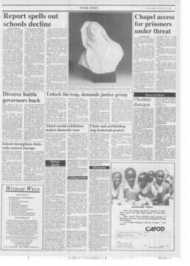Page 10, 11th October 1991
Page 10

Report an error
Noticed an error on this page?If you've noticed an error in this article please click here to report it.
Tags
Share
Related articles
Debating The Extent Of Debate In Our Universities
Three Blind Marxists See How They Run —to London
. . . And He Didn't Take Sides
Some B
Political Theory
Lecturing to the Lefties
MARXISM is dead as a political dogma. But is it dead in the British Universities? I wonder. Having attended a British university over the last two yeals as a mature student it seems to me the Marxist, or. I should say, in that useful French word Marxisant, or Marx-ish, influence runs pretty deep in academia. In the week that the Berlin wall fell, in 1989,1 listened to a lecture on: "Homer's Odyssey and the rise of the bourgeois property ethic". "Jane Eyre and the governess as Proletariat" wasn't far behind.
As an Irish Catholic it amused me to observe that it is very OK to be Irish in academic circles: Irish means ethnic, literary, and oppressed by the Brits. While it is very non-OK to be Catholic: Catholic means authoritarian, reactionary, and anti-abortion, which you are simply not allowed to be amongst the intelligentsia, unless you take great care to keep it to yourself.
(Imagine someone telling you "Of course, you may be antiapartheid, just so long as this is a private choice and you don't seek to impose your views on anyone else"!) Anyway, it's a funny feeling when people like your race, and despise your religion.
Actually, 1 don't mind academics being Marx-ish, so long as the Marx-ish view is part of a plurality of views. Marxist theory, as an academic study, has a contribution to make to history and sociology, it seems to me: class attitudes are quite important to analyse.
There were, and still are, groups such as "peasants", "property classes" and so on, and Marx-ish analyses can be a healthy antidote to obsessive individualism, or, indeed, the demented shores of feminism. (Not all women were oppressed in Victorian England: the Duchess of Westminster probably had a very good time indeed, at least in comparison to a landless male agricultural worker.)
But if academic freedom means anything, Marx-ish views should only be some among many; and if Marx-ish views are tolerated, so should Fascistic views. Objectively speaking, Mussolini wasn't without intellectual interest; Franco wasn't very nice, but he was able to provide for a transition to democracy in Spain, and chose an excellent man to be king.
Yet in a seminar on European drama at a British university, say, it would be inconceivable, still, to put the pro-Franco view on the Spanish Civil War in a discussion on Lorca Spanish Drama. It just wouldn't occur to anyone that Franco had a point of view. In that sense, the intellectual Left is still very much the prevailing mode. A fellow collegian told me last week that during a seminar on modern France the young lecturer told the students to read Le Monde
twice weekly: "Not Le Figaro that's very right-wing." But we live in a pluralist society! You're allowed to be "right-wing", if you want to! A healthy society can, and should, discuss all intellectual and politi:ai ideas.
What do the academics themselves think? The leading Marxist academic today is Professor Terry Eagleton, at Linacre College, Oxford. He is a very successful academic: his slim volumes Marxism and Literary Criticism, The Function of Criticism have each sold over 100,000 copies apiece, partly because they are recommended reading for all Eng Lit students.
Professor Eagleton has been much demonised as the chief university Leftie, though interestingly, he started off life as an Irish Catholic, and was at one stage much involved in liberal organisations. As he progressed through the groves of academe, he became more Irish and less Catholic.
What does Prof Eagleton say about Marxism and academic life now? "I don't have anything to say. Just that I am still a Marxist." He is very glad that the communist regimes in the east have fallen, as he does not, as I understand it, regard them as having been proper Marxists. He does not recant his definition of literary criticism as a "struggle against the bourgeois state".
Professor Roger Scruton, the unashamedly right-wing Birkbeck thinker actually had a hand in bringing down some of the Iron Curtain regimes. He is revered in Czechoslovakia as a sort of Scarlet Pimpernel de nos jours. He says that the atmosphere in academia has already changed toward the likes of him. "I've noticed people like myself are no longer quite so ostracised regarded as quaint and ridiculous, but no longer regarded as evil. A lot of my colleagues who had been scornful of m) work in East Europe have been shaken to discover that it was the right thing and not the wrong thing."
Professor Kenneth Minogue, who has the chair in Political Science at the LSE, believes that Marxism is a chameleon. The academic Marxists have seen the collapse of Communism coming and "there has thus been a steady movement into other things."
"The seepage is now into feminism and green issues. The dramatic political development is the proposed alliance between feminists and the Third World advocates, though women in the Third World are in a very different situation from western feminists. The whole basis of ideological movements is the exploitation of grievances." Yet, as Professor Minogue points out, the new alliances between greens and feminists and Third World champions are fraught with conflict.
Perhaps Norman Stone, Professor of Modern History at Oxford, is closest to the truth when he says that academics, actually,-are most concerned with capital than with capitalism. "I think they're obsessed, not altogether wrongly, with the terrible drop in status. A secretary in the City of London is now paid more than a senior lecturer at Oxbridge something like £20,000 annually."
Tailpiece: A joke going the rounds in London rather makes the point that academic achievement is not always necessary to get to the top in England.
Question: "What do John Major, the Archbishop of Canterbury and Princess Diana have in common?" Answer: they hardly have one '0'-level between them!
CHARTERHOUSE regular, and much-loved Catholic Herald contributor, Virginia Barton, is ill in hospital at present. Please remember her in your prayers.
blog comments powered by Disqus











